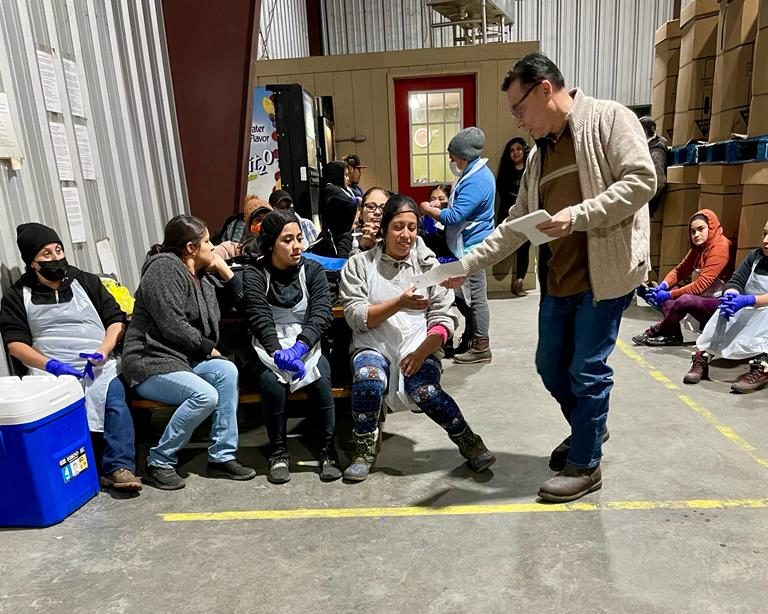At 7:30am workers begin filing into the large tin building, surrounded by heavy machinery and pallets stacked high. Tucked away amongst sweet potato farms in rural North Carolina sat an agricultural packing shed that is part of Battleboro Produce. Here workers, the majority of whom are women and from Mexico, sort and pack sweet potatoes that will be shipped out across the United States and make their way into European supermarkets. Amongst the crowd of women were three organizers with the Farm Labor Organizing Committee, AFL-CIO and its non-profit and training arm, the Campaign for Migrant Worker Justice (CMWJ).
For two years, organizers from both the non-profit and union had been meeting with the women at Battleboro Produce before their shift started, during their lunch break, and sometimes in the parking lot, discussing issues ranging from police accountability and immigration to problems they were having at work. Today though was different, today workers were getting their union ID cards, after having successfully negotiated a union contract with their employer that guarantees overtime pay, an 8% wage increase, union business paid leave, bereavement pay and more. They were now officially part of the Farm Labor Organizing Committee and would have union representation and a collective voice.
“We have benefits now, we have rights and representation!”-a new FLOC union member at Battleboro Produce

FLOC has been representing the sweet potato farmworkers who harvest the crop that ends up at Battleboro Produce for years now. At Battleboro, as is typical in agriculture, there is a significant overlap between those who work the harvest and those who pack and sort the goods. Often times, whole families would work on the farms in varying capacities. It was through routine conversations and discussions with sweet potato farmworkers that FLOC was introduced to the women in the packing shed.
Organizing for labor rights in the deep South is already a tough charge, but organizing migratory immigrant workers meant confronting both anti-labor and anti-immigrant sentiment. One cannot organize a group of immigrant workers without tackling larger issues facing the community, workplace abuse and immigration is intrinsically linked.
It is a mistake to see community and labor as separate.
The women at Battleboro first became part of FLOC through the associate membership, which is comprised of local immigrant community members who fall outside of the formal H-2A visa system (the U.S. guestworker program) covered under FLOC’s collective bargaining agreement. The vast majority of associate members work in the periphery of agriculture or in informal sectors but reside permanently in the United States. The economic and racist systemic oppression facing farmworkers in the United States does not spare our other community members, liberation and justice for one group is tied to the other.
FLOC and CMWJ’s overall organizing strategy and mission is to build immigrant power, fight for workers’ rights, and hold those in power accountable.
After the women at Battleboro Produce became associate members, FLOC and CMWJ began conducting know your rights trainings and setting the foundation for trainings on collective action and discussions on the power of organized labor. During these trainings, AnaLilia emerged as a leader at her workplace. Originally from Mexico, she has worked at Battleboro for over 10 years and throughout that time she has become an informal representative for her colleagues, they go to her when they have issues, and she helps mediate any friction there may be with supervisors.

After FLOC and CMWJ organizers would leave, AnaLilia would often speak with other workers, urging them to join the union stating “the Campaign for Migrant Worker Justice is supporting and helping us, and they are going to be there with anything that we might need. Us with the union and the union with us!” Having never been part of a union before, either in the United States or Mexico, AnaLilia shared that she came on board because it seemed obvious, there was a lot of support the union could offer.
Building trust with the women at Battleboro was an essential component to organizing workers in support of the union. Through the associate membership and subsequent meetings, FLOC and CMWJ made it clear that our purpose went beyond improving working conditions but included day to day injustices like discrimination within the school system and tenant rights.
After a few weeks of negotiations, a collective bargaining agreement was signed, meaning AnaLilia and the rest of her colleagues will have what many workers in a right to work state do not have: a collective voice and union representation.

